Article 77: Coffee – energy sublimating scientific thinking
Stemming from the very functions of awakening and creativity, coffee and coffee shops were suitable for acceptance and exchange of academic and practical knowledge, leading to a drastic change in scientific thinking.
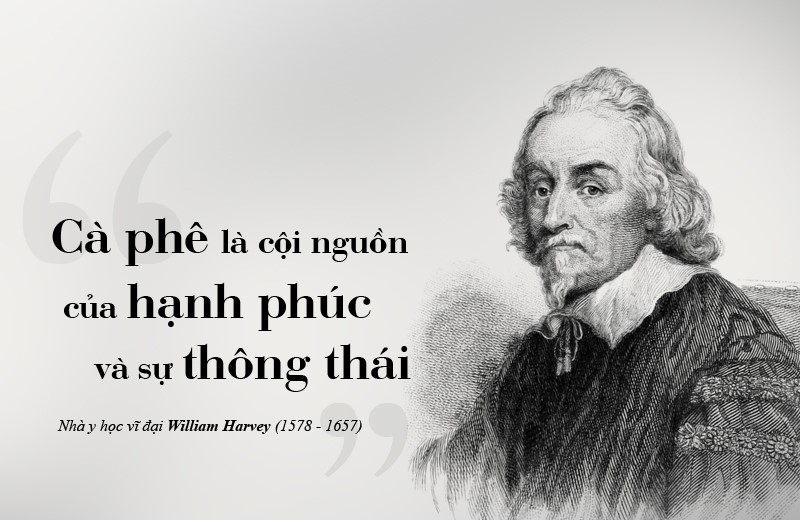
“Coffee is the source of happiness and wisdom.” – The great physician William Harvey (1578-1657)
The space dominating scientific reasoning
From the middle of the 16th century, the scientific revolution became the center of European civilization. Nicolaus Copernicus’ heliocentric cosmology (1473-1543) triggered the explosive development of mathematics, physics, astronomy, biology, and chemistry, sending the first signals to start a new world. Thinkers believed that, through reason and science, humans would understand nature and exist in harmony with its laws, thereby progressing to happiness and achieving a perfect life. But first, man had to know about the nature of nature based on experimental discoveries.
That impulse had a profound impact on the human psyche of all fields, especially in the intelligentsia. They demanded a major overhaul of all knowledge processes to promote the advancement of human divine learning and creation. The changing perception of the value of evidence, experiment or observation required a more appropriate scientific methodology. At this time, Francis Bacon’s empirical method was considered superior to the old ways of reasoning. According to Francis Bacon, science must be based on concrete observations, then to assumptions and eventually to scientific laws.
Francis Bacon’s method made a big difference in scientific activity. The need for information was increasing, research results needed to be spread widely and quickly. Therefore, a new social space was needed, as a knowledge exchange organization, as a premise for inventions to improve the lives of mankind.
At that time, coffee appeared in Europe and was hailed as a panacea for the brain, a drink that brings alertness, suitable for people who want to improve their thinking and ability to work effectively. The rise of the coffee habit led to the formation of coffee shops, which were recognized as an important social organization, meeting the requirements of providing an academic space – where scientists could gather to review, discuss, and critique new discoveries or old theories.
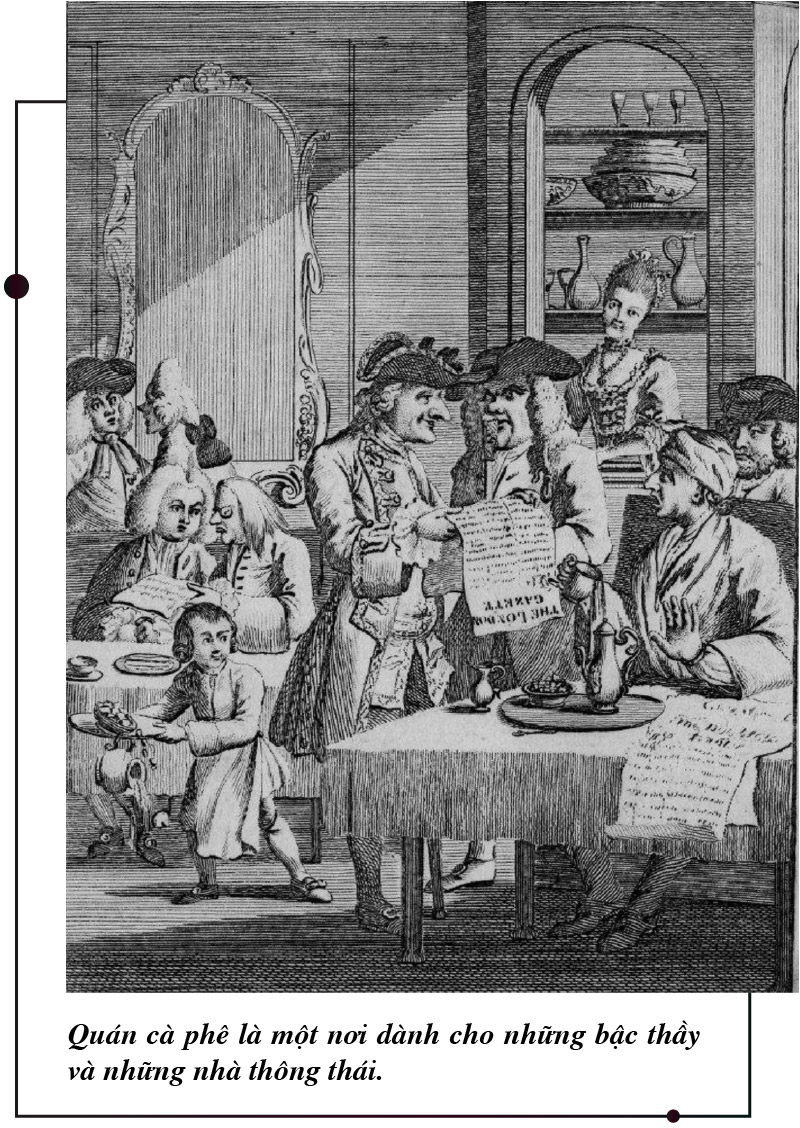
The cafe was the place for the masters and the wise.
Slaughter’s Coffee House in London (UK) was famous as a center for mathematical research. Abraham de Moivre – a pioneer in the development of analytic trigonometry and probability theory almost permanently resided at Slaughter’s. Also in the UK, Tillyard’s coffee house was where chemist Peter Staehl held professional lectures for his students. Prominent scientists Isaac Newton, William Whiston, Francis Hauksbee, Robert Hooke, Edward Tyson, Edmund Halley … also carried out scientific experiments right at the cafes. One of the founders of modern chemistry, Robert Boyle, called coffee houses a “hidden school” suitable for acceptance and knowledge exchange.
The scientific associations formed in the cafe became a training-research model, establishing an important foundation in the development of the sciences. In 1655, a group of erudite scientists formed the Oxford Coffee Club at Tillyard’s Café to discuss their theories and research. This is the predecessor organization of the British Royal Society, which to this day is one of the leading scientific societies in the world. After that, the Spitalfields Mathematical Society (1717), the Royal Society of Arts (1754), the Royal Astronomical Society (1820)… were all born from British cafes.
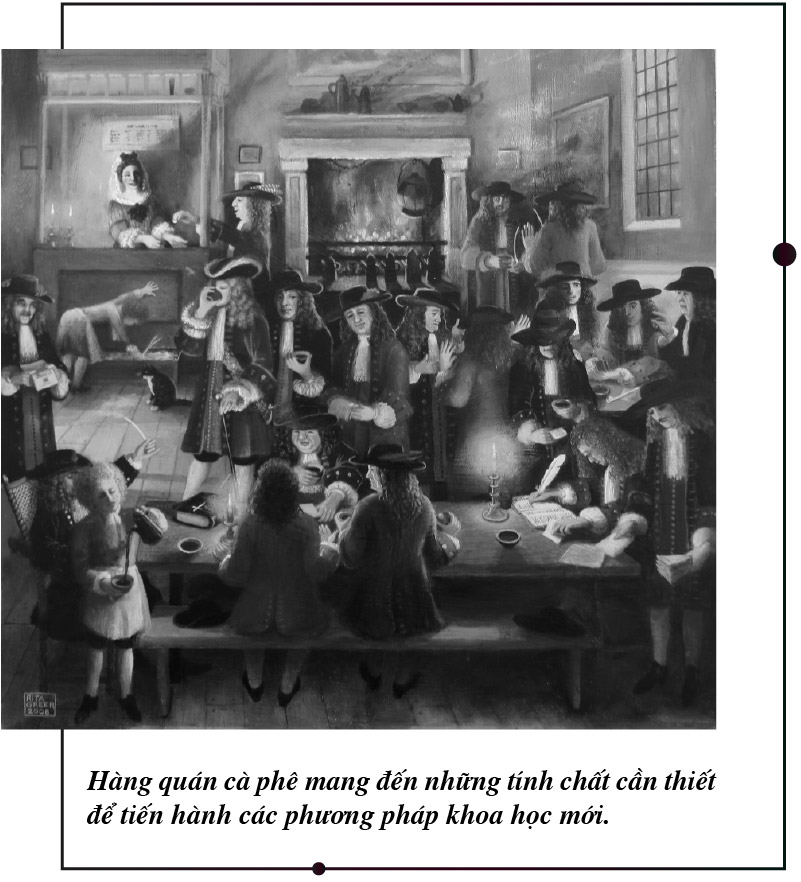
The coffee house brought the properties needed to conduct new scientific methods.
The 17th and 18th centuries can be said to be the era of cafes and scientific associations and academies. The public lectures and experiments of scientists at the cafe trained a new force of scientists and spread knowledge from academia to the masses. Archaeologist Philippe Sylvestre Dufour and his colleagues analyzed the pharmacological effects of coffee and confirmed that coffee is good for the body and mind. Chemist Louis Lémery also conducted research on the effects of coffee and reached similar conclusions to Dufour.
Coffee – the energy for scientists
During the 19th century, scientific knowledge applied to the industrial revolution significantly changed social life. One of the hallmarks of 19th-century science was its discovery of the nature of matter. Coffee also became an object of scientific research. In 1820, chemist Friedlieb Ferdinand Runge isolated caffeine for the first time. Then, in 1821, chemist Pierre Jean Robiquet isolated and characterized caffeine. In the same year, two chemists Pierre Joseph Pelletier and Joseph Bienaimé Caventou performed elemental analysis of caffeine. In 1895, chemist Emil Fischer synthesized caffeine for the first time, and two years later he gave the structural formula of the compound. This is part of the work for which Emil Fischer was awarded the Nobel Prize in 1902.
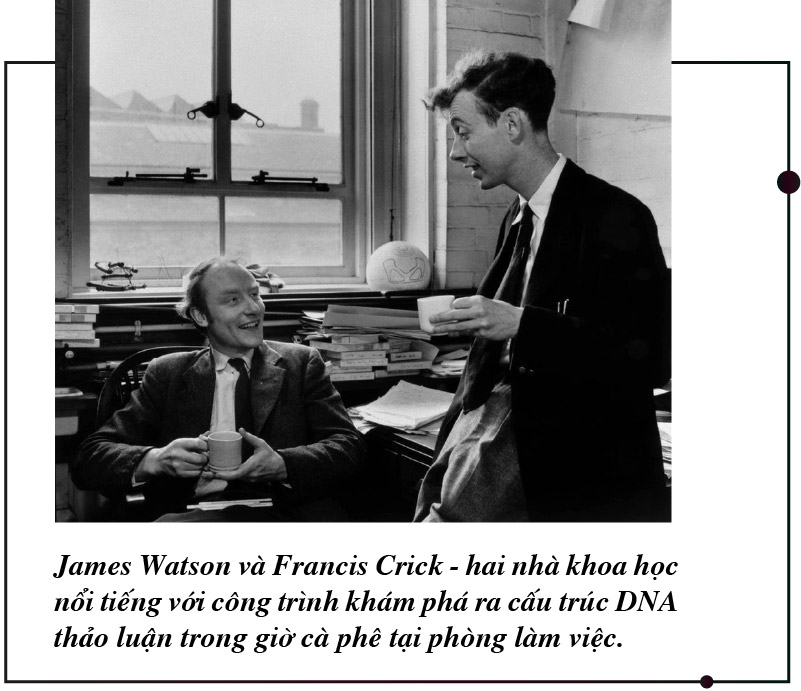
James Watson and Francis Crick – two scientists famous for their discovery of the structure of DNA discussed during coffee time in the office.
Scientific studies confirming coffee’s overall effect on thinking, physical and mental well-being pushed the world’s coffee consumption to increase 20 times. Moving into the 20th century, technology and science developed like a hurricane, affecting people’s ideology and lifestyle. Coffee enjoyment also began to diversify with the invention of production machinery and equipment for preparation. Instant coffee (1901), paper coffee filter (1908), vacuum freeze-dried coffee (1938), modern espresso machine (1946) making coffee easy to go from the shop into every home, on every desk and in research labs, even following scientists into a natural field setting.
After the 1950s, coffee became a global drink, popular only after water. In particular, the power nations with most developed science are the world’s highest per capita coffee consumers. According to a CareerBuilder survey, people working in science, creativity and education drink more coffee than other occupations.
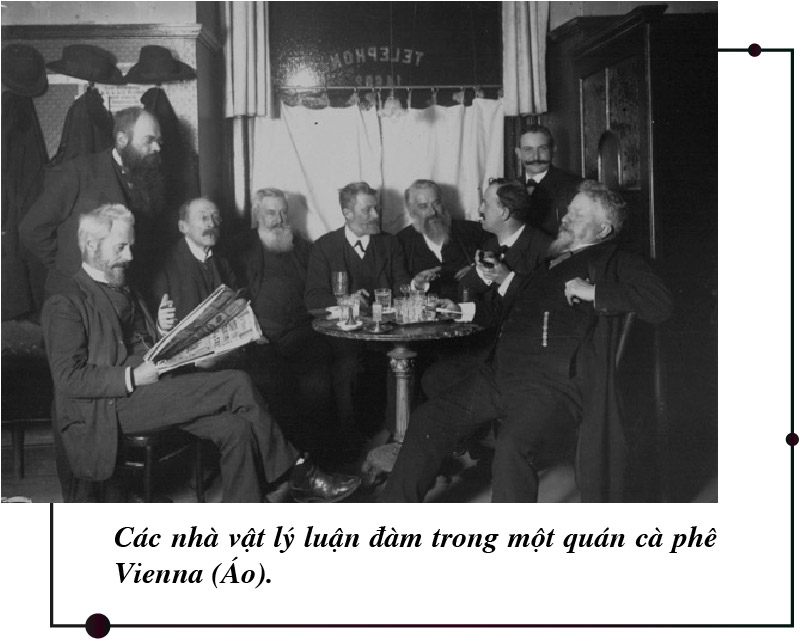
Physicists held a discussion in a cafe in Vienna (Austria)
Coffee has been almost an energizing starter and companion throughout the development of modern science. Science holds that things and phenomena in the universe occur in consistent patterns that can be understood through systematic study. Scientists perceive truth by intellectual intuition and by reasoning power. Right in the process, coffee directly affects the ability to focus observation, thinking, analysis and deduction to draw the right theories as the foundation for inventions that can change the world.
Also from the function of enhancing the efficiency of the central nervous system, sublimating intelligence and increasing cognitive performance, coffee is both the energy for the scientists and the object of scientific research. Over the centuries, discoveries about coffee have appeared continuously in all the natural and social sciences. At the same time, many devices were invented to fully enjoy the benefits of coffee as well as develop a variety of forms of coffee enjoyment. There are many scientists who have acknowledged that coffee is a miracle of nature. Professor Charles Bass Reed (University of California) said that “Coffee can be considered the nutrient of genius”. Or as the mathematician Alfréd Rényi once said, “A mathematician is a machine for turning coffee into theorems.” From there, we understand why science needs coffee as an essential energy.
THE REAL COFFEE
ROASTED ONLY FOR PEOPLE OF WISDOM!
Source: “The Philosophical Way of Coffee” – copyright by Trung Nguyen Legend


